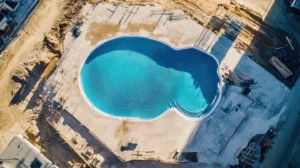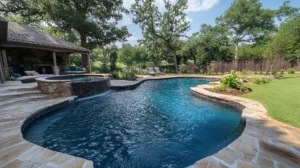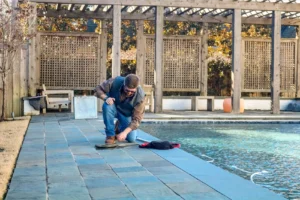It may not be glamorous, but balancing swimming pool chemicals is an important, year-round job. Whether you’re just opening up your pool after a long winter or prepping to host graduation pool parties, staying on top of your pool chemicals and pool cleaning will help you ensure you getting the most out of your swimming pool.
It may seem complicated at first, but with our handy pool chemicals guide, achieving the right balance for silky, clear pool water is pretty straightforward.
Let’s assume you’re already familiar with the anatomy of your pool and just dive in to the main pool cleaning chemicals you’ll need to keep your pool crystal clear.
What Does a Pool With Properly Balanced Pool Chemicals Look Like?
You can often tell if your pool water is balanced by the look, feel, and smell of the pool water. It should be clear, silky, and not smell strongly of chlorine. Regular testing is the key to monitoring your pool cleaning chemical levels. You can take your own chemical readings with a water test kit or call us to come out and conduct a complimentary on-site water test to make it quick and easy.
PRO TIP: Many local Memphis pool companies charge about $90 on average for you to bring a sample of your pool water to their store or office for testing. And, that fee increases if you have them come to you home or property to conduct the test. At Ogden Pools, we offer free complimentary pool water testing on-site at your home or property. No hidden fees.
If you’ve already got enough things to keep an eye on, you can hire our pool maintenance team to regularly vacuum your pool, check chemical levels, and clean your filters.
To ensure swimming pool chemical balance, the pH should be between 7.2 to 7.8, total alkalinity should range from 80 to 120 ppm (parts per million), calcium hardness should fall between 200 to 400 ppm, and free chlorine should sit between 1 to 3 ppm.
A Guide to The Six Most Important Pool Chemicals
Depending on the needs of your pool, there are different pool chemicals that you will need to use. Generally speaking, these are the swimming pool chemicals you’ll need to know about to keep your pool water balanced.
1. Chlorine
Chlorine is the most common chemical used to sanitize a pool. According to the American Chemistry Council, chlorine “acts as a rapid and persistent sanitizer, an effective algaecide and a strong oxidizer of undesired contaminants.” In other words, chlorine is the pool chemical that keeps your pool clean, clear, and safe to swim in. However, chlorine is insufficient by itself and requires the help of other swimming pool chemicals to keep the water in ideal conditions for the chlorine to do its job.
Chlorine should be added regularly to keep the levels between 1 and 3 ppm. To take the hassle out of constantly adding chlorine liquid or tablets, consider an automated chlorinator. Ogden Pools provides can provide our memphis pool owners with these automated systems. And, for our weekly pool maintenance and cleaning clients, we provide them at no cost.
2. Bromine
Bromine is a less common sanitizer that’s similar to chlorine. Bromine is more stable than chlorine indoors and in high heat applications (i.e. hot tubs), but it doesn’t last as long as chlorine outdoors when exposed to UV light from the sun.
3. Oxidizers
With so many potential contaminants lurking in swimming pool water, many pool owners turn to nonchlorine oxidizers as a secondary solution (in addition to chlorine) to keep their pools clean. Chemical shock-treatments like potassium monopersulfate can be added every so often to help the chlorine break down organic contaminants. For best results, shock treatments should be added to a pool in the evening or at night to keep the oxidizer from being destroyed by UV rays.
4. Cyanuric Acid for Swimming Pools
On its own, chlorine doesn’t like to stick around in the water—especially when exposed to sunlight. That’s why you may need cyanuric acid.
Cyanuric acid is a pool stabilizer that helps you keep more chlorine in your pool, meaning a cleaner pool and having to buy less chlorine. Many chlorine tablets contain cyanuric acid, but it’s important not to have too little or too much of it in your pool to avoid both overuse of chlorine and damaging your pool.
5. pH Increaser/Decreaser
Managing the pH balance of your pool is both delicate and critical for your swimming pool chemicals to do their job. If you have a lot of algae or too much of one chemical, it can easily throw off your pool’s delicate pH balance.
When you need to increase your pool’s pH, soda ash can be mixed into a large bucket of water and added to the pool. In cases when you need to decrease your pool’s pH, sodium bisulfate or muriatic acid can quickly drop it down.
6. Alkalinity Adjusters
Alkalinity helps stabilize your pool water’s pH. Murky pools are a good sign that your alkalinity is off. When alkalinity is too high or too low, it’s important to balance it out with an alkalinity adjuster.
To increase your total alkalinity (TA), sodium bicarbonate can be added to the pool when it falls below 100 ppm. Muriatic acid can be used to lower the total alkalinity of your pool’s water (it works equally well for reducing pH).
You may not use them very often but keeping all of these swimming pool chemicals on hand means you can quickly address problems when they crop up. The levels of swimming pool chemicals should be checked more often during the busy summer months when smiling, sun-screened bodies fill the pool and easily alter the water chemistry. Pool sanitation systems are helpful to automate this time-consuming process and maintain swimming pool chemical balance.
Check Out: What Is Swimming Pool Alkalinity?
Pool alkalinity refers to the measurement of the water’s capacity to resist changes in pH levels. It acts as a buffer, helping to stabilize the pH and maintain a comfortable and safe environment for swimmers.
Handling and Storing Pool Chemicals
Pool cleaning chemicals should always be handled with care and stored properly, preferably in their original containers. Remember to keep your swimming pool chemicals out of reach of children and pets, in a cool, dry location with good ventilation — away from any heat or electrical sources. Make sure each chemical container is properly sealed and stored off the ground but close to the floor to avoid falling hazards. And always store solid and liquid pool chemicals separately.
Always open pool chemical containers in a well-ventilated area and use caution when introducing different chemicals to your pool water. Certain swimming pool chemicals should not be mixed, like muriatic acid and chlorine, which can form dangerous chlorine gas when combined. When in doubt about handling and storing pool chemicals, refer to the Material Data Safety Sheet (MSDS) provided with each pool chemical and be sure to follow product label instructions.
Clean Water is More than Swimming Pool Chemicals
Swimming pool chemicals alone won’t keep your pool clean. Brushing algae off the walls and into the filter will make pool chemicals last longer since they’re not working as hard. In addition to our Weekly Pool Maintenance and Cleaning Program, Ogden Pools is the leading Memphis pool company and provider of automated and robotic pool cleaners that will supplement your pool cleaning and can be controlled remotely using our convenient manufacturer mobile apps.


